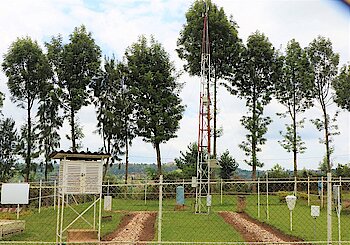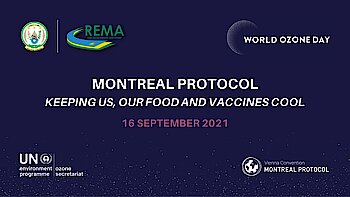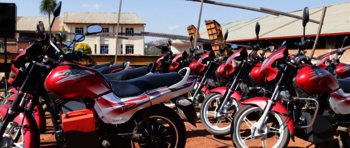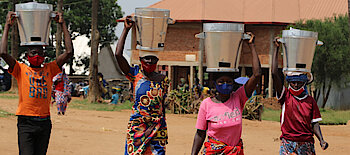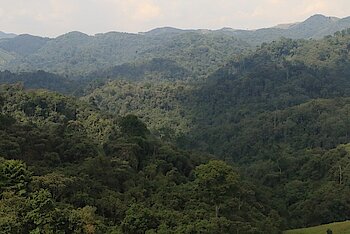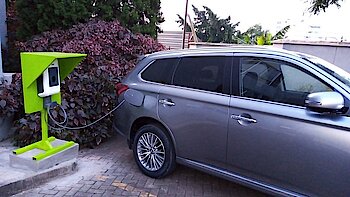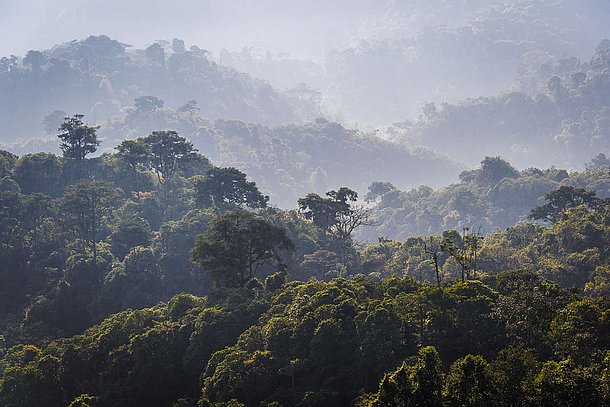
How Rwanda is putting its forests first in the fight against climate change
In 2011, Rwanda introduced a Green Growth and Climate Resilience Strategy to guide the country to become a developed, low carbon economy by 2050. Recognising the importance of the country’s forests to this goal, the strategy features ‘Sustainable Forests and Agroforestry’ as one of 14 programmes of action.
The ‘Sustainable Forests and Agroforestry’ programme aims to ensure effective and long-term management of both individual and government-owned forests.
Today, 30.4% of Rwanda is covered with forests. Furthermore, every year Rwandans plant millions of trees as part of an annual tree planting season with the common objective to maintain the forest coverage and increase their productivity.
Some of the outcomes of the Green Growth and Climate Resilience Strategy under the ‘Sustainable Forests and Agroforestry’ programme of action are highlighted below.
- Achieving 30.4% forestry cover in Rwanda
Thanks to Rwanda's vision and forward-thinking policies, the country became one of the early adopters of the Bonn Challenge - a global effort to bring 150 million hectares of the world’s deforested and degraded land into restoration by 2020, and 350 million hectares by 2030. In 2011, Rwanda set the goal of restoring two million hectares of deforested and degraded land by 2020.
Rwanda’s efforts to manage existing forests, reforest and restore areas of the country and achieve its Bonn Challenge commitments have led to 30.4% of the country being covered with forests. These areas play an important role in mitigating Rwanda’s contribution to climate change. Efforts are now in place to develop new green and public space in Rwanda’s cities as per recently developed land-use masterplans. The development of the Nyandungu Wetland in the City of Kigali into a recreational facility is one example of this.
The country has also established Tree Seed Centres in Gatsibo and Huye districts to increase the availability of high-quality seeds. The centres will promote improved woodlot management, efficient charcoal production, alternative energy and, importantly, improved seed quality. The Tree Seed Centres are a one-stop-shop for tree seed supply activities, such as establishing new seed sources, tree improvement, genetic conservation, as well as seed collection, processing and distribution. The centres will build on Rwanda’s reforestation successes, and support efforts to scale up agroforestry across the country.
- Forest Planting Season and Umuganda
The Government of Rwanda has invested in afforestation and reafforestation through an annual forest planting season. For instance, Rwandans planted 25 million trees during the 2020/21 Forest Planting Season in an effort to expand and restore forests and contribute to the global effort to address climate change. The season’s planting efforts included 7,400 hectares of agroforestry, 900 hectares of classic forest and 77,000 fruit trees. 500 hectares of private woodlots were rehabilitated to increase their productivity. This year, approximately 43 million trees will be planted.
Rwanda’s monthly community service brings people together to achieve a common outcome. Known as Umuganda, this home grown initiative has provided the opportunity for people to engage in planting trees to increase the country’s forest coverage as well as protect the environment in their local area.
Today, the current country’s forest cover is equivalent to 30.4% - about 724,662 hectares. Of this, 53% are plantations, 21% are wooded savannas, 19% are natural mountain rainforests and 6.2% are shrubs.
- Privatisation (leasing) of woodlots for efficient forest management
Under the country’s privatisation policy, Rwanda has partnered with the private sector to ensure the efficient management of the state-owned forests. The Ministry of Environment launched the first Private Forest Management Units in 2019 to safeguard individual forests and boost forest harvesting as a strategy to maintain and manage woodlots effectively. Today, 23,456.15 hectares (equivalent to 38.4% of state forests) are now managed by private investors through long term concession agreements.
- Creation of Gishwati-Mukura National Park
Rwanda recently created one of Africa's newest national parks, Gishwati-Mukura, to protect ancient rainforests and chimpanzees. The park is made up of two separate forests – the larger Mukura and smaller Gishwati – which are located within the landscape. The forests sit on the ridge which divides the Congo and Nile water catchment areas, along the biodiverse Albertine Rift.
The rehabilitation of the Gishwati-Mukura landscape and the creation of the park was made possible with the support of the Global Environment Facility and the World Bank through the Landscape Approach to Forest Restoration and Conservation (LAFREC) project implemented by the Rwanda Environment Management Authority in close collaboration with Rwanda Forestry Authority, Rwanda Development Board and Districts. The five-year project built on the work done by the Forest of Hope Association and rehabilitated Gishwati-Mukura using a landscape approach to bring the forest ecosystems into better management and realise a range of benefits for local communities.
The Rwanda Development Board is now working on a multi-phased conservation and tourism management programme for Gishwati-Mukura focused on ecology and conservation initiatives including ranger presence, law enforcement, science, engagement with community cooperatives, human-wildlife conflict resolution, research, environmental monitoring and responsible tourism promotion. The programme is being developed in partnership with the local government and Imizi, a subsidiary of Wilderness Safaris.
- Expanding Volcanoes National Park
Rwanda is embarking on an ambitious project to expand Volcanoes National Park and ensure a bright future for the mountain gorillas that call its mountain forests home. This once in a generation initiative will expand the park by approximately 23%, increasing its size by 37.4 square kilometres (3,740 hectares).
Volcanoes National Park is a fragile ecosystem and currently relatively small at just 160 square kilometres. That is why Rwanda is expanding the park by almost a quarter of its current size. A larger park will improve the mountain gorilla habitat and support a 15-20% increase in the population size and a 50% reduction in infant gorilla mortality.
The expansion of Volcanoes National Park will improve the lives of the communities living around the park and make visiting the gorillas an even more incredible experience.
Learn more about the expansion of Volcanoes National Park at www.visitrwanda.com/gorillas.
Topics
More posts
How Rwanda is using climate change data and projections to plan for the future
In 2011, Rwanda adopted a Green Growth and Climate Resilience Strategy to become a developed, climate-resilient, and low-carbon economy by 2050. To…
Rwanda celebrates World Ozone Day
Kigali, 16 September, 2021 - Today, Rwanda joins the rest of the world to mark the International Day for the preservation of the Ozone Layer. World…
Retrofit Electric Motorcycles Project; Another step towards emission reduction
The Greenhouse gases emission inventory report of 2015 indicated that the vehicles (that burns the fossil fuel) emit emissions at 13% of the total…
What you should know about Climate Adaptation Summit 2021 that is taking place online
Even though, the climate change is increasingly distressing, fortunately, there are many actions we can do to ensure our future is as prosperous as…
Beneficiaries of REMA’s Green Amayaga Project receive improved cookstoves to promote energy efficiency
Rwanda Environment Management Authority through the Forest Landscape Restoration in the Amayaga Region (Green Amayaga) Project is distributing…
Develop business and deliver green growth solutions
The economic development is a concern for every country around the World and everyone is concerned with personnel development. However, it is no…
From ambition to action: Rwanda’s climate resilience plan
On Saturday, December 12, 2020, global leaders are meeting to discuss a problem on many of our minds: climate change. The extraordinary virtual…
Green New Deal: Lesson Learned from the Republic of Korea, Rwanda and the European Union
This webinar was co-organized by the Korea Ministry of Foreign Affairs and the UNDP Seoul Policy Centre (USPC). It is the second event on the theme of…
REMA get the Electric Vehicle to support Rwanda's environmental protection efforts
The Rwanda Environment Management Authority (REMA) has taken delivery of its first ever electric vehicle that will be used to support the…
